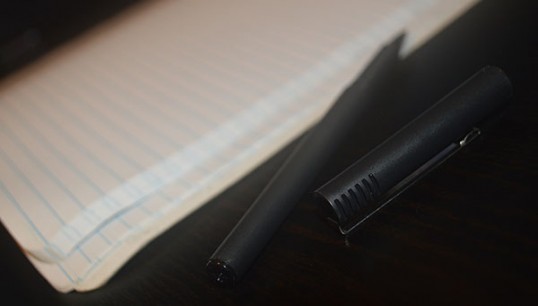 If you’ve ever had the impulse to write a book but aren’t necessarily sure on how to begin or find it hard to keep going, here are a few tips from author and Yuba College adjunct professor, Michael Golding.
If you’ve ever had the impulse to write a book but aren’t necessarily sure on how to begin or find it hard to keep going, here are a few tips from author and Yuba College adjunct professor, Michael Golding.
Set a time to write. It doesn’t matter how long or how much you get written, the fact of the matter is that setting yourself up to write is one of the most important things you can do. Golding, who sets his writing time in the mornings, states, “Showing up every morning is very important for me. It keeps it warm, it keeps it alive.”
Make an outline. Whether it is an outline of the whole book or chapter by chapter, having a map of what you want to write or where you want to go with your writing will help guide you along the process. But remember to be open to changes. Golding states, “The best days are when I’m surprised.”
Keep writing – finish the book! This may seem like an obvious tip but it’s easier said than done. Focus on writing the next word or the next sentence. As stated before, it doesn’t matter how much you get written in a day as long as you don’t give up. But what about writer’s block? When asked what he does about writer’s block, Golding answers, “I never use the term writer’s block.” He goes on to say that he believes it to be self-crippling because we are affected by the things we tell ourselves, in this case that we have the ‘condition’ of writer’s block.
Don’t forget to edit. It seems that people are always at the opposite extremes when it comes to editing. There are a lot of writers who will tell you to not edit anything at all until you are finished with your first draft. And there are some who will encourage you to go back and edit what you’ve written right away. It can go either way really. Going back to edit often can help get you over a hurdle if you’re stuck but at the same time, it can also make you lose your rhythm or flow. Golding states that he “can’t handle the mess of 300 pages of an unedited manuscript” but that he believes that the work shouldn’t be edited so much that it is sterilized, losing its raw potential.
Write for yourself. In my opinion, this is the most important tip of all. Sure, other people will read and criticize your work, but what really matters is that you wrote something you enjoyed writing. If you find the story intriguing, sad, heartwarming, or if it just makes you feel something, chances are others will too. Golding states that how well received your book is doesn’t affect the rich experience of writing the book. The experience is what matters.
One of the things Golding wishes new writers knew about the world of publishing is that it is not impenetrable. It may be tough – after all, your work won’t be the only one being pitched to the publishers. But it can happen. Golding suggests getting an agent, which can be obtained by participating in writing groups, attending writing workshops, or simply sending your manuscript to the agents themselves. Golding states, “There are many doors that are locked that agents have access to.” But you can always self-publish as well. By self-publishing, you will be responsible for and in full control of the whole process from the design of the cover and interior, formats, price, distribution, marketing and public relations. It can be daunting to have so much on your hands, but sites such as Amazon’s Kindle Direct Publishing has helpful tools to help you self-publish whether it is an eBook or a physical copy.
Remember, these are simple tips to help you – they aren’t rules you are obligated to follow. Trust in your instincts and decisions when you’re writing, and eventually things will begin to add up.
You can find out more about Michael Golding and his book A Poet of the Invisible World here.
Note: This article was featured in the Fall 2015 print edition of The Prospector
My name is Tou Thor. Kid at heart, part-time procrastinator, and lover of video games and books. Interests include reading, writing, and eating – if I’m not doing one of those things, I’m probably sleeping. Or dead. Anyway, enjoy !
Comment Policy: Comments are welcomed and encouraged. However, the editorial board reserves the right to edit or delete, without notice, any comments submitted to the blog. For more details, see our full Comment Policy.